Pedagogical Resource Tool: Implications in Chemical Education
VerifiedAdded on 2022/01/04
|6
|1770
|22
Report
AI Summary
This report analyzes the implications and importance of pedagogical resource approaches, specifically focusing on reflective practice, in the field of chemical and medical education. It assesses a peer-reviewed article that examines the use of reflective practice tools among medical students, summarizing the research and relating it to conceptual learnings. The report explores the benefits and implications of this pedagogical strategy, including the positive impact on students' awareness, critical thinking, and ability to connect theoretical knowledge with practical experiences. It also draws parallels with a European journal discussing the use of reflection in training therapists, highlighting the importance of self-awareness and the development of skills. The findings emphasize the value of daily reflections in identifying mistakes, improving plans of action, and enhancing overall learning outcomes for students in medical and other professional fields. The report concludes with a strong emphasis on the benefits of pedagogical tools and the importance of the tool in educational framework.
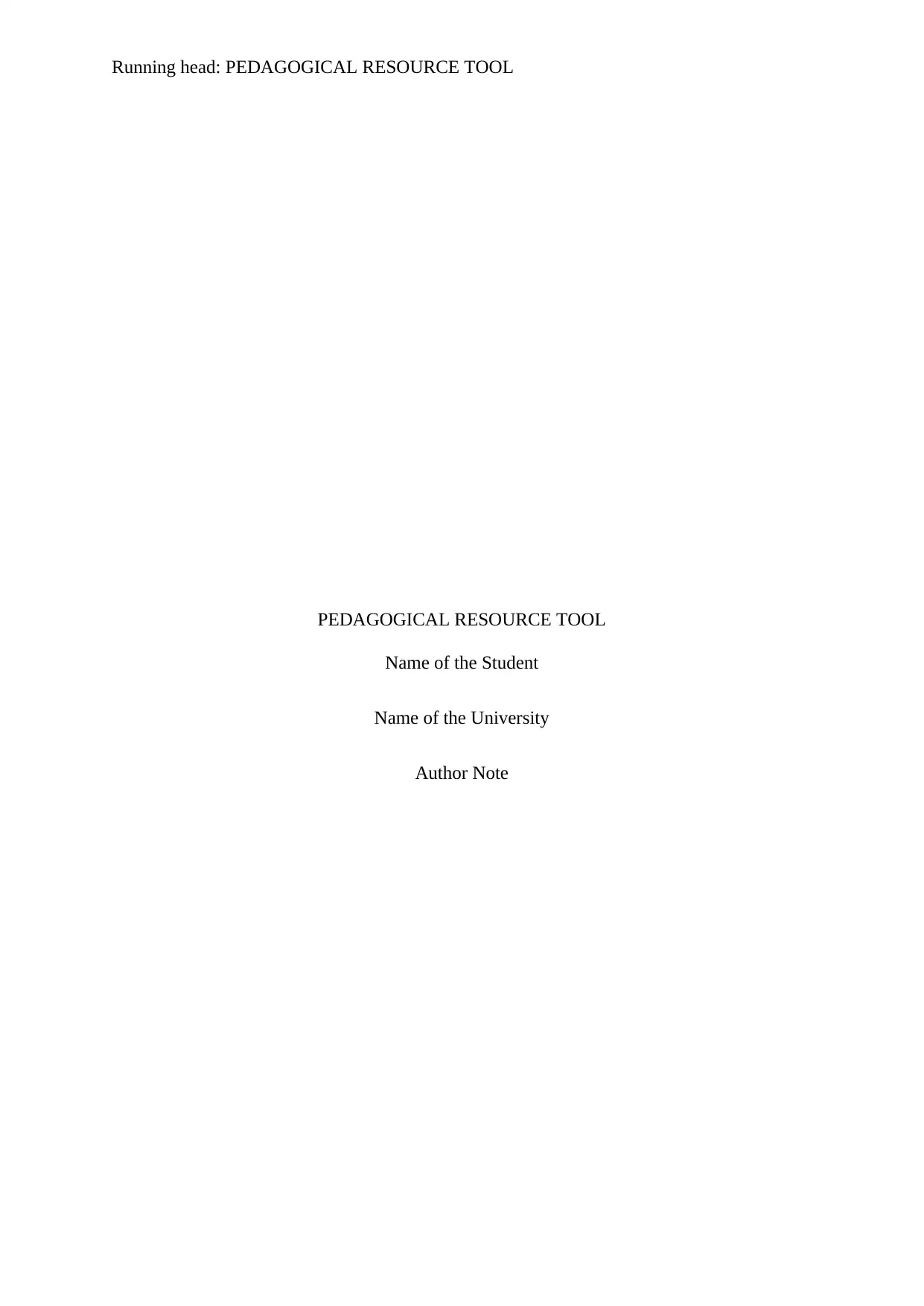
Running head: PEDAGOGICAL RESOURCE TOOL
PEDAGOGICAL RESOURCE TOOL
Name of the Student
Name of the University
Author Note
PEDAGOGICAL RESOURCE TOOL
Name of the Student
Name of the University
Author Note
Paraphrase This Document
Need a fresh take? Get an instant paraphrase of this document with our AI Paraphraser
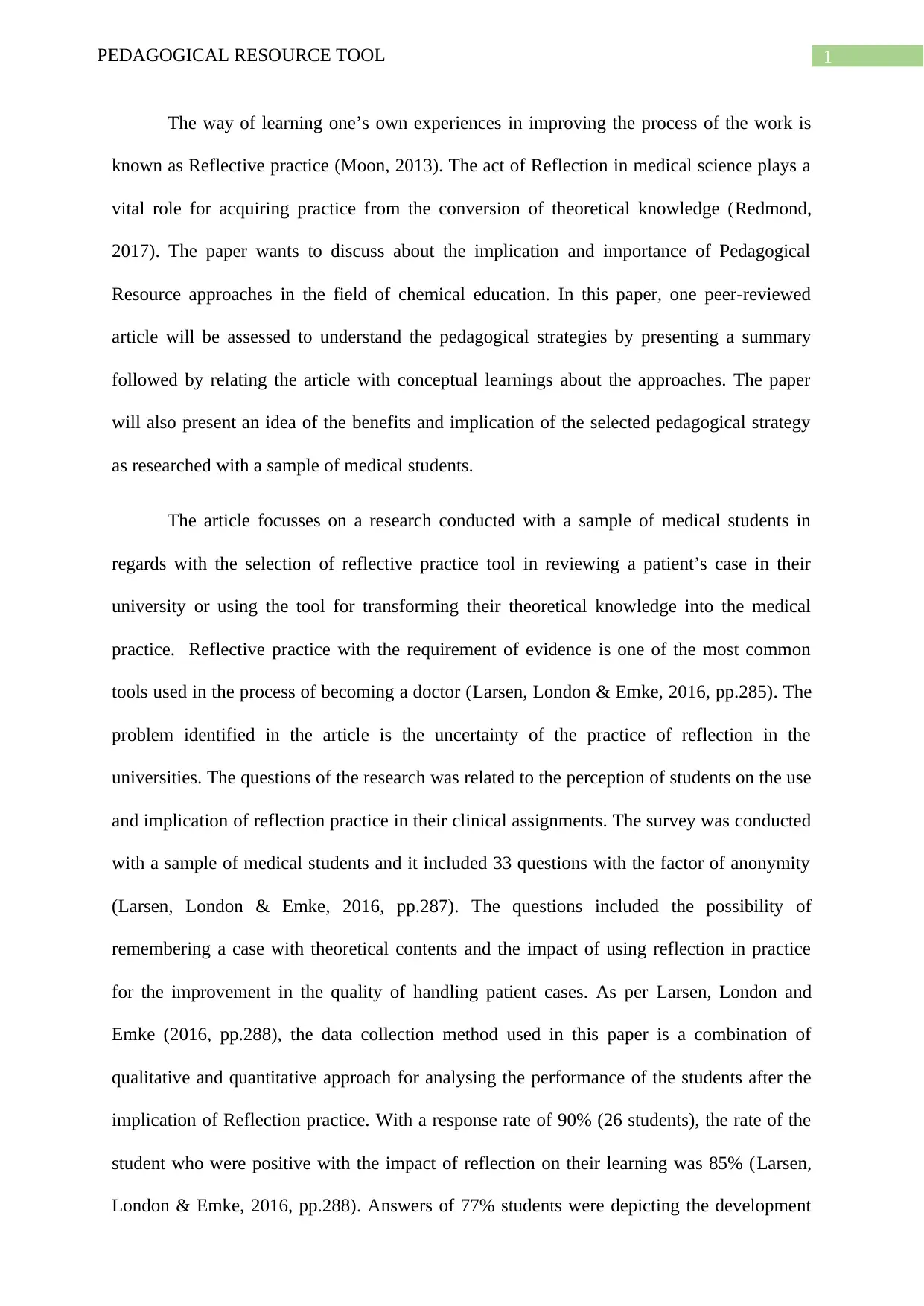
1PEDAGOGICAL RESOURCE TOOL
The way of learning one’s own experiences in improving the process of the work is
known as Reflective practice (Moon, 2013). The act of Reflection in medical science plays a
vital role for acquiring practice from the conversion of theoretical knowledge (Redmond,
2017). The paper wants to discuss about the implication and importance of Pedagogical
Resource approaches in the field of chemical education. In this paper, one peer-reviewed
article will be assessed to understand the pedagogical strategies by presenting a summary
followed by relating the article with conceptual learnings about the approaches. The paper
will also present an idea of the benefits and implication of the selected pedagogical strategy
as researched with a sample of medical students.
The article focusses on a research conducted with a sample of medical students in
regards with the selection of reflective practice tool in reviewing a patient’s case in their
university or using the tool for transforming their theoretical knowledge into the medical
practice. Reflective practice with the requirement of evidence is one of the most common
tools used in the process of becoming a doctor (Larsen, London & Emke, 2016, pp.285). The
problem identified in the article is the uncertainty of the practice of reflection in the
universities. The questions of the research was related to the perception of students on the use
and implication of reflection practice in their clinical assignments. The survey was conducted
with a sample of medical students and it included 33 questions with the factor of anonymity
(Larsen, London & Emke, 2016, pp.287). The questions included the possibility of
remembering a case with theoretical contents and the impact of using reflection in practice
for the improvement in the quality of handling patient cases. As per Larsen, London and
Emke (2016, pp.288), the data collection method used in this paper is a combination of
qualitative and quantitative approach for analysing the performance of the students after the
implication of Reflection practice. With a response rate of 90% (26 students), the rate of the
student who were positive with the impact of reflection on their learning was 85% (Larsen,
London & Emke, 2016, pp.288). Answers of 77% students were depicting the development
The way of learning one’s own experiences in improving the process of the work is
known as Reflective practice (Moon, 2013). The act of Reflection in medical science plays a
vital role for acquiring practice from the conversion of theoretical knowledge (Redmond,
2017). The paper wants to discuss about the implication and importance of Pedagogical
Resource approaches in the field of chemical education. In this paper, one peer-reviewed
article will be assessed to understand the pedagogical strategies by presenting a summary
followed by relating the article with conceptual learnings about the approaches. The paper
will also present an idea of the benefits and implication of the selected pedagogical strategy
as researched with a sample of medical students.
The article focusses on a research conducted with a sample of medical students in
regards with the selection of reflective practice tool in reviewing a patient’s case in their
university or using the tool for transforming their theoretical knowledge into the medical
practice. Reflective practice with the requirement of evidence is one of the most common
tools used in the process of becoming a doctor (Larsen, London & Emke, 2016, pp.285). The
problem identified in the article is the uncertainty of the practice of reflection in the
universities. The questions of the research was related to the perception of students on the use
and implication of reflection practice in their clinical assignments. The survey was conducted
with a sample of medical students and it included 33 questions with the factor of anonymity
(Larsen, London & Emke, 2016, pp.287). The questions included the possibility of
remembering a case with theoretical contents and the impact of using reflection in practice
for the improvement in the quality of handling patient cases. As per Larsen, London and
Emke (2016, pp.288), the data collection method used in this paper is a combination of
qualitative and quantitative approach for analysing the performance of the students after the
implication of Reflection practice. With a response rate of 90% (26 students), the rate of the
student who were positive with the impact of reflection on their learning was 85% (Larsen,
London & Emke, 2016, pp.288). Answers of 77% students were depicting the development
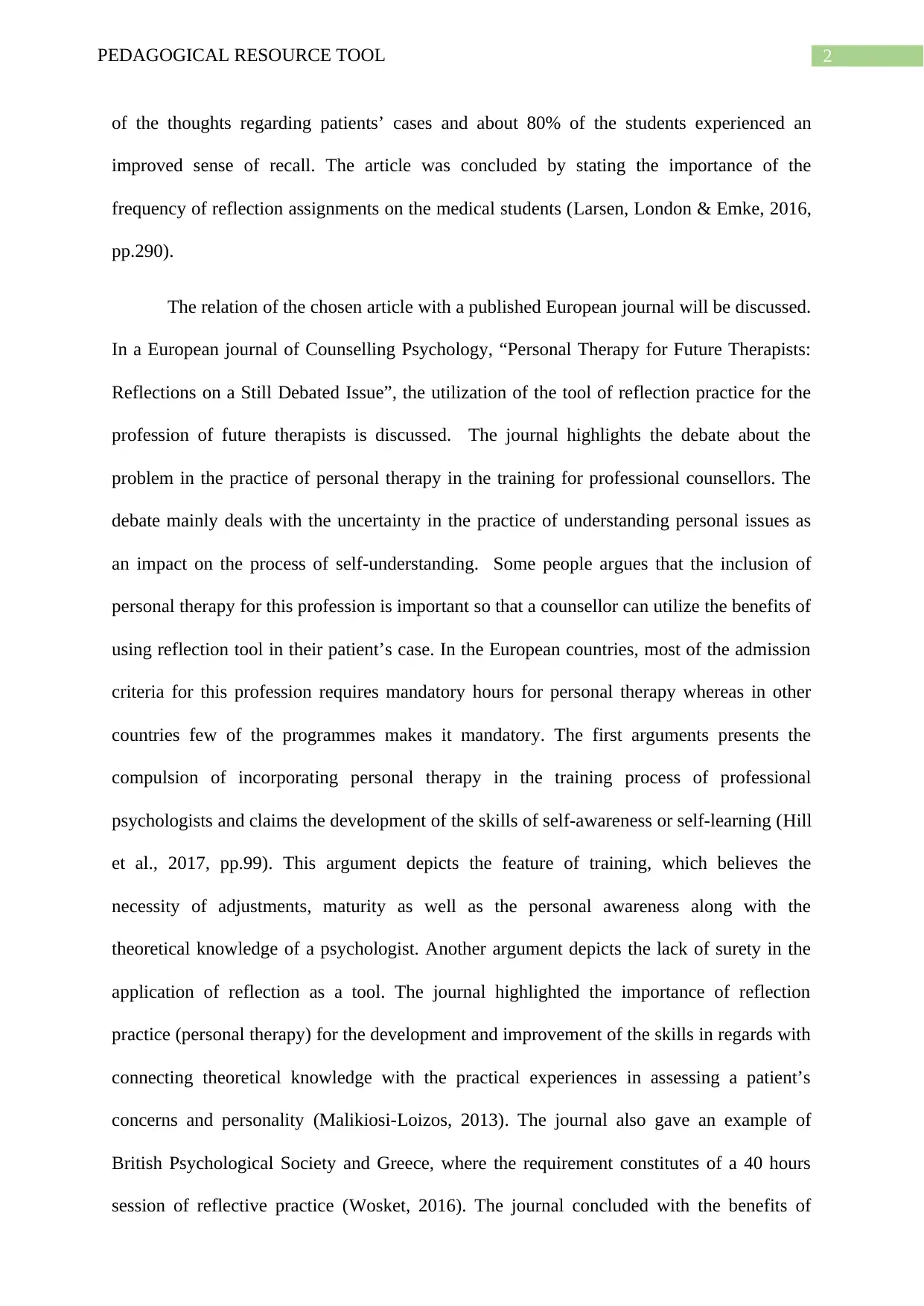
2PEDAGOGICAL RESOURCE TOOL
of the thoughts regarding patients’ cases and about 80% of the students experienced an
improved sense of recall. The article was concluded by stating the importance of the
frequency of reflection assignments on the medical students (Larsen, London & Emke, 2016,
pp.290).
The relation of the chosen article with a published European journal will be discussed.
In a European journal of Counselling Psychology, “Personal Therapy for Future Therapists:
Reflections on a Still Debated Issue”, the utilization of the tool of reflection practice for the
profession of future therapists is discussed. The journal highlights the debate about the
problem in the practice of personal therapy in the training for professional counsellors. The
debate mainly deals with the uncertainty in the practice of understanding personal issues as
an impact on the process of self-understanding. Some people argues that the inclusion of
personal therapy for this profession is important so that a counsellor can utilize the benefits of
using reflection tool in their patient’s case. In the European countries, most of the admission
criteria for this profession requires mandatory hours for personal therapy whereas in other
countries few of the programmes makes it mandatory. The first arguments presents the
compulsion of incorporating personal therapy in the training process of professional
psychologists and claims the development of the skills of self-awareness or self-learning (Hill
et al., 2017, pp.99). This argument depicts the feature of training, which believes the
necessity of adjustments, maturity as well as the personal awareness along with the
theoretical knowledge of a psychologist. Another argument depicts the lack of surety in the
application of reflection as a tool. The journal highlighted the importance of reflection
practice (personal therapy) for the development and improvement of the skills in regards with
connecting theoretical knowledge with the practical experiences in assessing a patient’s
concerns and personality (Malikiosi-Loizos, 2013). The journal also gave an example of
British Psychological Society and Greece, where the requirement constitutes of a 40 hours
session of reflective practice (Wosket, 2016). The journal concluded with the benefits of
of the thoughts regarding patients’ cases and about 80% of the students experienced an
improved sense of recall. The article was concluded by stating the importance of the
frequency of reflection assignments on the medical students (Larsen, London & Emke, 2016,
pp.290).
The relation of the chosen article with a published European journal will be discussed.
In a European journal of Counselling Psychology, “Personal Therapy for Future Therapists:
Reflections on a Still Debated Issue”, the utilization of the tool of reflection practice for the
profession of future therapists is discussed. The journal highlights the debate about the
problem in the practice of personal therapy in the training for professional counsellors. The
debate mainly deals with the uncertainty in the practice of understanding personal issues as
an impact on the process of self-understanding. Some people argues that the inclusion of
personal therapy for this profession is important so that a counsellor can utilize the benefits of
using reflection tool in their patient’s case. In the European countries, most of the admission
criteria for this profession requires mandatory hours for personal therapy whereas in other
countries few of the programmes makes it mandatory. The first arguments presents the
compulsion of incorporating personal therapy in the training process of professional
psychologists and claims the development of the skills of self-awareness or self-learning (Hill
et al., 2017, pp.99). This argument depicts the feature of training, which believes the
necessity of adjustments, maturity as well as the personal awareness along with the
theoretical knowledge of a psychologist. Another argument depicts the lack of surety in the
application of reflection as a tool. The journal highlighted the importance of reflection
practice (personal therapy) for the development and improvement of the skills in regards with
connecting theoretical knowledge with the practical experiences in assessing a patient’s
concerns and personality (Malikiosi-Loizos, 2013). The journal also gave an example of
British Psychological Society and Greece, where the requirement constitutes of a 40 hours
session of reflective practice (Wosket, 2016). The journal concluded with the benefits of
⊘ This is a preview!⊘
Do you want full access?
Subscribe today to unlock all pages.

Trusted by 1+ million students worldwide
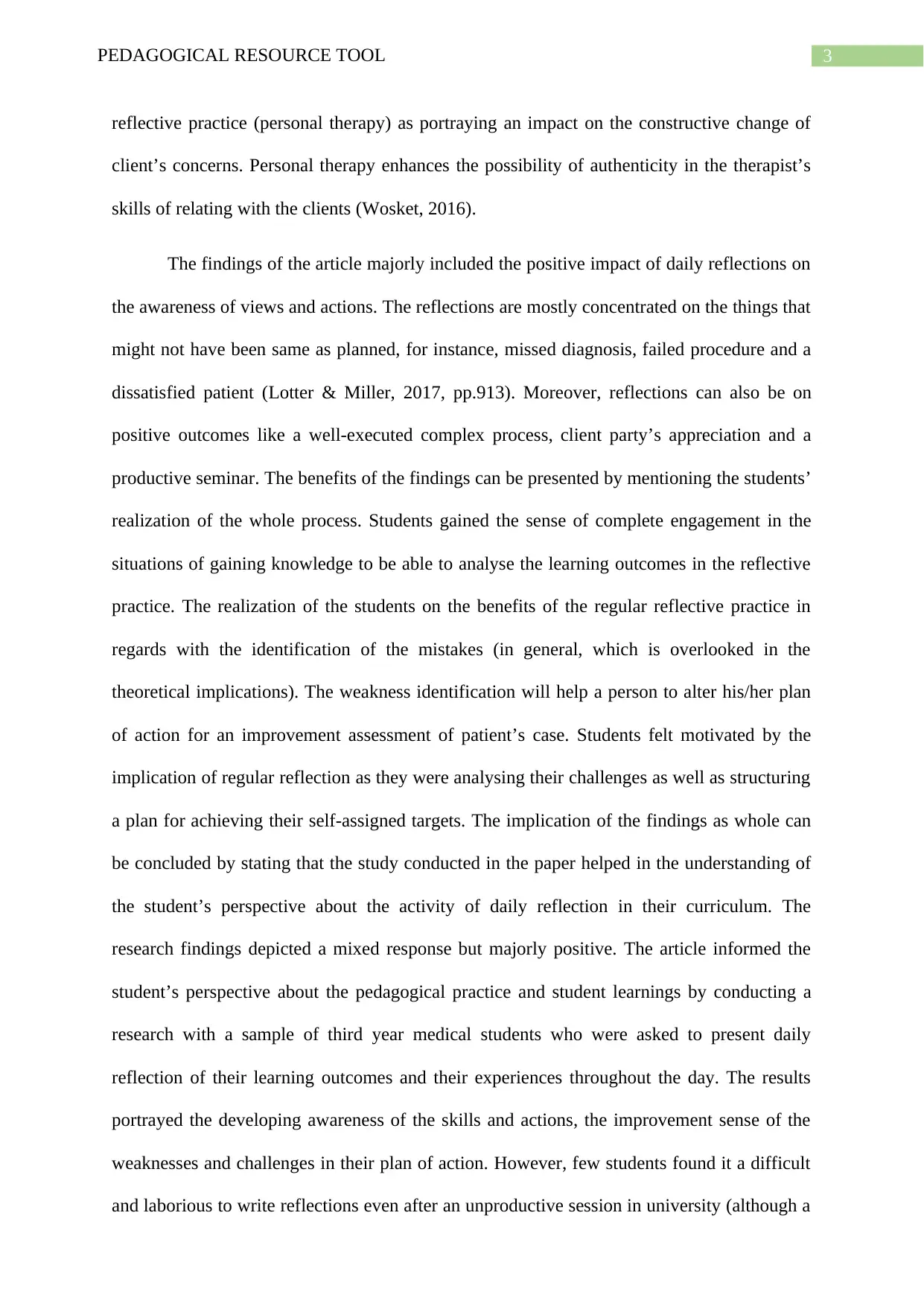
3PEDAGOGICAL RESOURCE TOOL
reflective practice (personal therapy) as portraying an impact on the constructive change of
client’s concerns. Personal therapy enhances the possibility of authenticity in the therapist’s
skills of relating with the clients (Wosket, 2016).
The findings of the article majorly included the positive impact of daily reflections on
the awareness of views and actions. The reflections are mostly concentrated on the things that
might not have been same as planned, for instance, missed diagnosis, failed procedure and a
dissatisfied patient (Lotter & Miller, 2017, pp.913). Moreover, reflections can also be on
positive outcomes like a well-executed complex process, client party’s appreciation and a
productive seminar. The benefits of the findings can be presented by mentioning the students’
realization of the whole process. Students gained the sense of complete engagement in the
situations of gaining knowledge to be able to analyse the learning outcomes in the reflective
practice. The realization of the students on the benefits of the regular reflective practice in
regards with the identification of the mistakes (in general, which is overlooked in the
theoretical implications). The weakness identification will help a person to alter his/her plan
of action for an improvement assessment of patient’s case. Students felt motivated by the
implication of regular reflection as they were analysing their challenges as well as structuring
a plan for achieving their self-assigned targets. The implication of the findings as whole can
be concluded by stating that the study conducted in the paper helped in the understanding of
the student’s perspective about the activity of daily reflection in their curriculum. The
research findings depicted a mixed response but majorly positive. The article informed the
student’s perspective about the pedagogical practice and student learnings by conducting a
research with a sample of third year medical students who were asked to present daily
reflection of their learning outcomes and their experiences throughout the day. The results
portrayed the developing awareness of the skills and actions, the improvement sense of the
weaknesses and challenges in their plan of action. However, few students found it a difficult
and laborious to write reflections even after an unproductive session in university (although a
reflective practice (personal therapy) as portraying an impact on the constructive change of
client’s concerns. Personal therapy enhances the possibility of authenticity in the therapist’s
skills of relating with the clients (Wosket, 2016).
The findings of the article majorly included the positive impact of daily reflections on
the awareness of views and actions. The reflections are mostly concentrated on the things that
might not have been same as planned, for instance, missed diagnosis, failed procedure and a
dissatisfied patient (Lotter & Miller, 2017, pp.913). Moreover, reflections can also be on
positive outcomes like a well-executed complex process, client party’s appreciation and a
productive seminar. The benefits of the findings can be presented by mentioning the students’
realization of the whole process. Students gained the sense of complete engagement in the
situations of gaining knowledge to be able to analyse the learning outcomes in the reflective
practice. The realization of the students on the benefits of the regular reflective practice in
regards with the identification of the mistakes (in general, which is overlooked in the
theoretical implications). The weakness identification will help a person to alter his/her plan
of action for an improvement assessment of patient’s case. Students felt motivated by the
implication of regular reflection as they were analysing their challenges as well as structuring
a plan for achieving their self-assigned targets. The implication of the findings as whole can
be concluded by stating that the study conducted in the paper helped in the understanding of
the student’s perspective about the activity of daily reflection in their curriculum. The
research findings depicted a mixed response but majorly positive. The article informed the
student’s perspective about the pedagogical practice and student learnings by conducting a
research with a sample of third year medical students who were asked to present daily
reflection of their learning outcomes and their experiences throughout the day. The results
portrayed the developing awareness of the skills and actions, the improvement sense of the
weaknesses and challenges in their plan of action. However, few students found it a difficult
and laborious to write reflections even after an unproductive session in university (although a
Paraphrase This Document
Need a fresh take? Get an instant paraphrase of this document with our AI Paraphraser
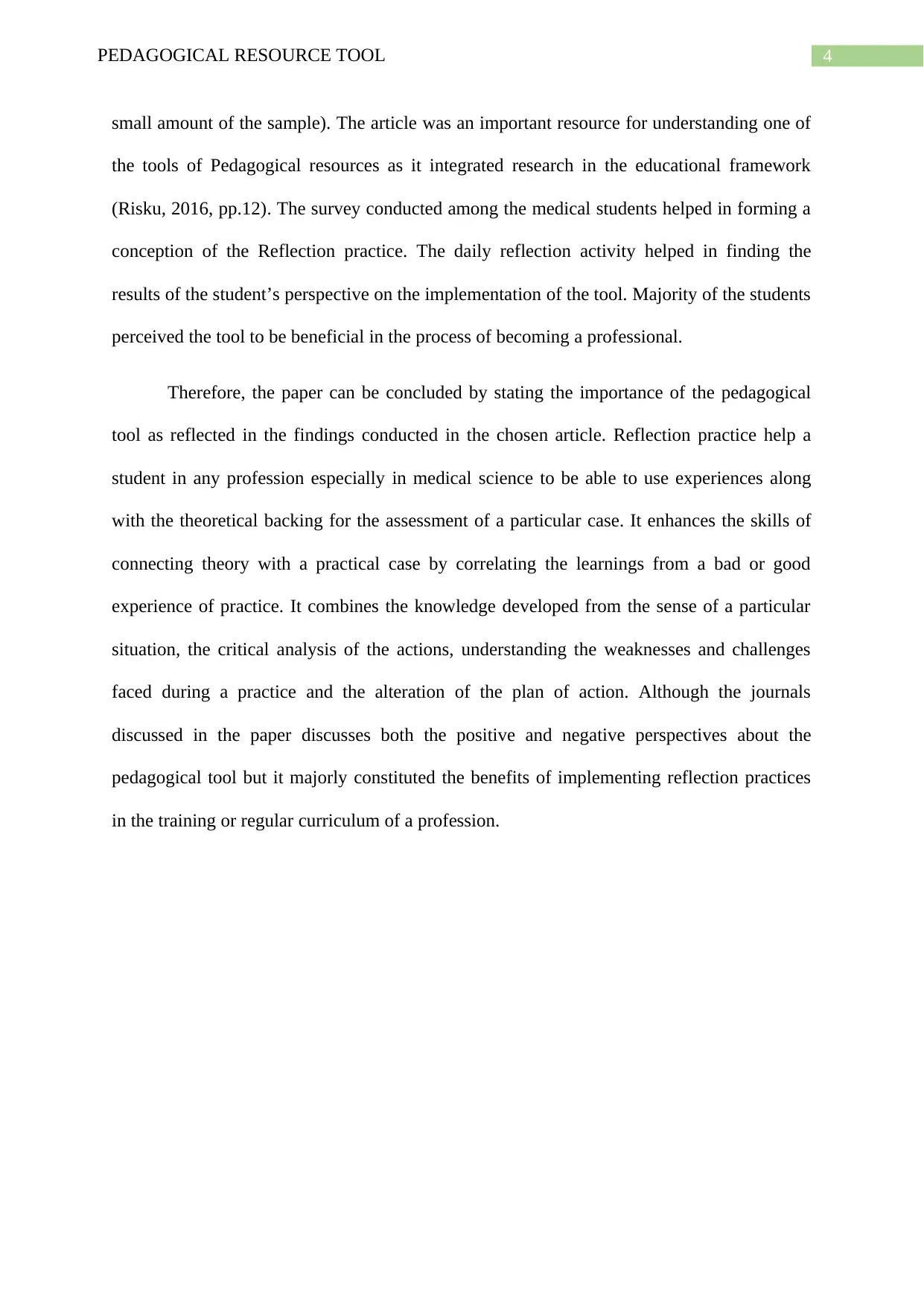
4PEDAGOGICAL RESOURCE TOOL
small amount of the sample). The article was an important resource for understanding one of
the tools of Pedagogical resources as it integrated research in the educational framework
(Risku, 2016, pp.12). The survey conducted among the medical students helped in forming a
conception of the Reflection practice. The daily reflection activity helped in finding the
results of the student’s perspective on the implementation of the tool. Majority of the students
perceived the tool to be beneficial in the process of becoming a professional.
Therefore, the paper can be concluded by stating the importance of the pedagogical
tool as reflected in the findings conducted in the chosen article. Reflection practice help a
student in any profession especially in medical science to be able to use experiences along
with the theoretical backing for the assessment of a particular case. It enhances the skills of
connecting theory with a practical case by correlating the learnings from a bad or good
experience of practice. It combines the knowledge developed from the sense of a particular
situation, the critical analysis of the actions, understanding the weaknesses and challenges
faced during a practice and the alteration of the plan of action. Although the journals
discussed in the paper discusses both the positive and negative perspectives about the
pedagogical tool but it majorly constituted the benefits of implementing reflection practices
in the training or regular curriculum of a profession.
small amount of the sample). The article was an important resource for understanding one of
the tools of Pedagogical resources as it integrated research in the educational framework
(Risku, 2016, pp.12). The survey conducted among the medical students helped in forming a
conception of the Reflection practice. The daily reflection activity helped in finding the
results of the student’s perspective on the implementation of the tool. Majority of the students
perceived the tool to be beneficial in the process of becoming a professional.
Therefore, the paper can be concluded by stating the importance of the pedagogical
tool as reflected in the findings conducted in the chosen article. Reflection practice help a
student in any profession especially in medical science to be able to use experiences along
with the theoretical backing for the assessment of a particular case. It enhances the skills of
connecting theory with a practical case by correlating the learnings from a bad or good
experience of practice. It combines the knowledge developed from the sense of a particular
situation, the critical analysis of the actions, understanding the weaknesses and challenges
faced during a practice and the alteration of the plan of action. Although the journals
discussed in the paper discusses both the positive and negative perspectives about the
pedagogical tool but it majorly constituted the benefits of implementing reflection practices
in the training or regular curriculum of a profession.
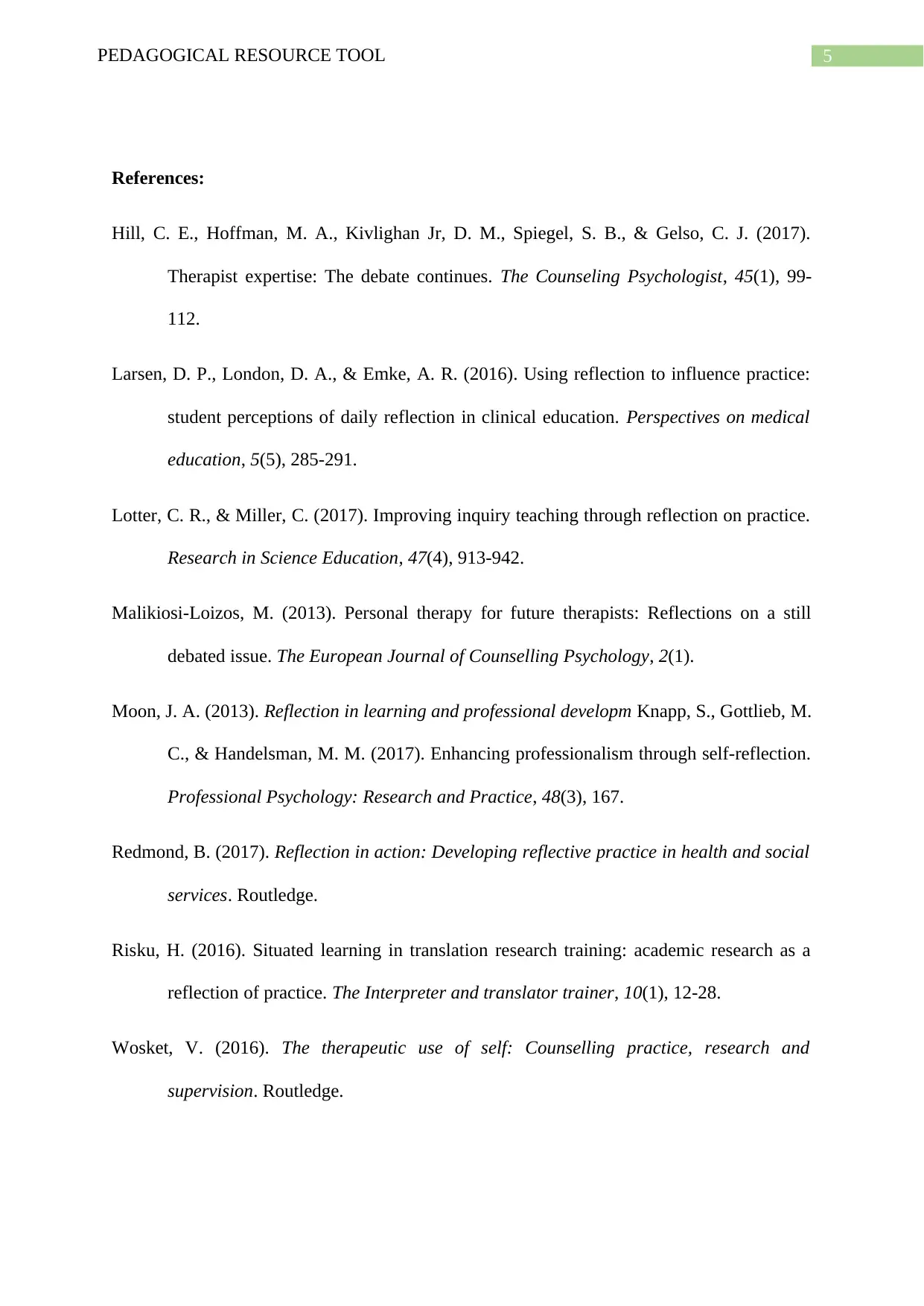
5PEDAGOGICAL RESOURCE TOOL
References:
Hill, C. E., Hoffman, M. A., Kivlighan Jr, D. M., Spiegel, S. B., & Gelso, C. J. (2017).
Therapist expertise: The debate continues. The Counseling Psychologist, 45(1), 99-
112.
Larsen, D. P., London, D. A., & Emke, A. R. (2016). Using reflection to influence practice:
student perceptions of daily reflection in clinical education. Perspectives on medical
education, 5(5), 285-291.
Lotter, C. R., & Miller, C. (2017). Improving inquiry teaching through reflection on practice.
Research in Science Education, 47(4), 913-942.
Malikiosi-Loizos, M. (2013). Personal therapy for future therapists: Reflections on a still
debated issue. The European Journal of Counselling Psychology, 2(1).
Moon, J. A. (2013). Reflection in learning and professional developm Knapp, S., Gottlieb, M.
C., & Handelsman, M. M. (2017). Enhancing professionalism through self-reflection.
Professional Psychology: Research and Practice, 48(3), 167.
Redmond, B. (2017). Reflection in action: Developing reflective practice in health and social
services. Routledge.
Risku, H. (2016). Situated learning in translation research training: academic research as a
reflection of practice. The Interpreter and translator trainer, 10(1), 12-28.
Wosket, V. (2016). The therapeutic use of self: Counselling practice, research and
supervision. Routledge.
References:
Hill, C. E., Hoffman, M. A., Kivlighan Jr, D. M., Spiegel, S. B., & Gelso, C. J. (2017).
Therapist expertise: The debate continues. The Counseling Psychologist, 45(1), 99-
112.
Larsen, D. P., London, D. A., & Emke, A. R. (2016). Using reflection to influence practice:
student perceptions of daily reflection in clinical education. Perspectives on medical
education, 5(5), 285-291.
Lotter, C. R., & Miller, C. (2017). Improving inquiry teaching through reflection on practice.
Research in Science Education, 47(4), 913-942.
Malikiosi-Loizos, M. (2013). Personal therapy for future therapists: Reflections on a still
debated issue. The European Journal of Counselling Psychology, 2(1).
Moon, J. A. (2013). Reflection in learning and professional developm Knapp, S., Gottlieb, M.
C., & Handelsman, M. M. (2017). Enhancing professionalism through self-reflection.
Professional Psychology: Research and Practice, 48(3), 167.
Redmond, B. (2017). Reflection in action: Developing reflective practice in health and social
services. Routledge.
Risku, H. (2016). Situated learning in translation research training: academic research as a
reflection of practice. The Interpreter and translator trainer, 10(1), 12-28.
Wosket, V. (2016). The therapeutic use of self: Counselling practice, research and
supervision. Routledge.
⊘ This is a preview!⊘
Do you want full access?
Subscribe today to unlock all pages.

Trusted by 1+ million students worldwide
1 out of 6
Your All-in-One AI-Powered Toolkit for Academic Success.
+13062052269
info@desklib.com
Available 24*7 on WhatsApp / Email
![[object Object]](/_next/static/media/star-bottom.7253800d.svg)
Unlock your academic potential
Copyright © 2020–2026 A2Z Services. All Rights Reserved. Developed and managed by ZUCOL.


